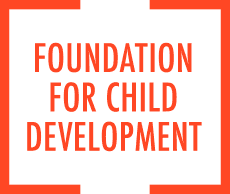All Resources Resources (cont'd)
Page 35 of 39
- Inside and Out: Developing an Advocacy Strategy for New Jersey’s PK-3 Agenda
New Jersey has a unique opportunity to realize a PK-3 vision.
June 3, 2010 • Read MoreChild Well-Being Index (CWI) 2008 ReportAnnual Release - July 22, 2008 The 2008 annual release of the Foundation for Child Development’s Child Well-Being Index (CWI) finds that after an upward trend for eight years, 1994 through 2002, progress in American children’s quality of life has now moved into a stall/slow growth period.
June 3, 2010 • Read MoreAn Ounce of Prevention: How Early Efforts for Education, Health and Safety Make a Critical Difference in the Well-Being of ChildrenCo-sponsored by Representative Mike Castle (R-DE) and Representative Bobby Scott (D-VA), The New America Foundation and the Foundation for Child Development hosted An Ounce of Prevention: How Early Efforts for Education, Health and Safety Make a Critical Difference in the Well-Being of Children, on Tuesday, September 9, 2008, from 1:30 p.m. to 3:00 p.m., at the Rayburn House Office Building, Room 2168, Capitol Hill.
June 3, 2010 • Read MoreAmerica’s Vanishing Potential: The Case for PreK-3rd EducationAMERICA’S VANISHING POTENTIAL: The Case For PreK-3rd Education Many people like to believe that American children are generally doing quite well in school.
June 3, 2010 • Read MoreSeizing the Opportunity: Building PK3 Systems in New Jersey’s School DistrictsNew Jersey’s new school funding formula will provide thousands of 3- and 4-year-olds from low-income families with the opportunity to experience a high-quality preschool program.
June 3, 2010 • Read MoreWhen Worlds Collide: Universal PreK Brings New Challenges for Public Elementary SchoolsIn a November/December 2008 Harvard Education Letter article, David McKay Wilson looks at Universal PreK and the challenges its implementation brings to public elementary schools.
June 3, 2010 • Read MoreThe Academic Trajectories of Children of Immigrants and Their School EnvironmentsIn this article for Developmental Psychology, Han examined 14,000 children from the Early Childhood Longitudinal Survey - Kindergarten Cohort (ECLS-K) to determine school’s role in shaping the academic performance of children of immigrants compared with native-born non-Hispanic white children.
June 3, 2010 • Read MoreThe Case for Investing in PreK-3rd Education: Challenging Myths about School ReformThe Foundation for Child Development Policy to Action Brief Series No. 1 Why do so many Americans believe that elementary schools are doing a fine job despite clear evidence to the contrary?
June 3, 2010 • Read MoreSign up for The Learning Curve
Stay up-to-date with the latest resources and insights coming from the Foundation for Child Development and its colleagues. We do not share or sell email addresses or any other information collected to outside parties. We will use your email address only to send you relevant content, and you can unsubscribe at any time.
